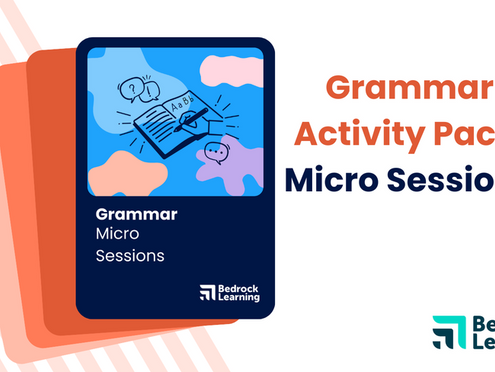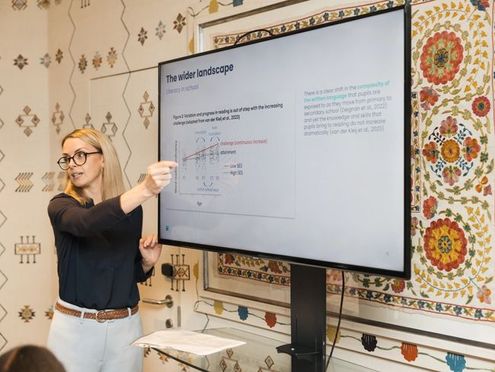This blog will look at the crucial role Tier 2 and 3 vocabulary instruction plays across all subject areas and discuss why all educators should consider themselves to be literacy teachers regardless of the subject they are teaching. We will also identify some of the key barriers that inhibit effective Tier 2 and 3 literacy teaching and how these barriers can be overcome.
What is tiered vocabulary?
The tiered system of vocabulary was first introduced by Isabel Beck and Margaret McKeown as a method of categorising words according to their meaning, specificity, and level of complexity.
Tier 1 vocabulary consists of everyday words with clear, unambiguous meanings such as ‘cat’, ‘book’ and ‘pencil’. This level of language is usually acquired organically at home, in social situations, and through conversations with peers and teachers at school without needing to be formally taught.
On the other hand, Tier 2 vocabulary is more academic and nuanced in nature and includes high frequency words such as ‘analyse’ ‘’quantify’ and ‘examine’, whereas Tier 3 vocabulary consists of low frequency, subject-specific terminology such as ‘algorithm’, ‘cardiovascular’ and ‘Renaissance’.
Both Tier 2 and Tier 3 vocabulary need to be explicitly taught in the classroom so that learners can understand and use this vocabulary accurately and confidently.
Why is disciplinary literacy instruction so important?
Disciplinary literacy instruction is an essential part of the effective delivery of lessons across all subject areas. This is because vocabulary forms the basis of teaching and learning in any subject, as without a clear understanding of the key concepts and terminology associated with the subject being taught, learners will be unable to develop an accurate knowledge of the subject matter.
Teaching Tier 2 and 3 vocabulary, therefore, must be a key part of any lesson, as the correct understanding and usage of vocabulary, is just as important in Mathematics, for example, as it is in English or History. If learners are to become engaged in the subject matter and develop a genuine connection with the key concepts, processes and systems related to the topic they are studying, they must first and foremost understand the vocabulary which is associated with that particular discipline.
Every teacher is a literacy teacher
Vocabulary instruction is no longer considered to be the sole remit of English language teachers, but instead, it is a key part of every teacher’s role no matter what subject they specialise in. If learners do not understand the words and phrases that are being taught in relation to certain topics, they are not going to be able to develop a sound knowledge of the subject itself.
Tier 2 and 3 vocabulary is the gateway to developing a sound understanding of all disciplines. This is why all teachers should consider themselves to be literacy instructors as well as subject specialists if they want their learners to succeed in their class, establish a true understanding of what they are being taught, enjoy what they are learning and even go on to become experts on the subject themselves one day.
What are the main barriers to effective Tier 2 and Tier 3 instruction?
Teaching disciplinary literacy is not a straightforward process and there are many preconceptions about the acquisition of vocabulary at school which may inhibit, rather than facilitate, the effective teaching and learning of disciplinary literacy.
Many subject specialists may feel that, traditionally, teaching vocabulary should be the domain of English teachers and, because of this, it can be difficult for subject-specific teachers to know where to start. Depending on the subject and the level being taught, the sheer volume of specialist terminology in some cases can seem overwhelming. Subject specialist teachers who have never explicitly taught vocabulary before can also not be fully aware of how students learn vocabulary, or they could assume that the learners already know the meaning of every word that is being discussed.
Target tier 3 vocabulary with Bedrock Mapper
Bedrock Mapper enables schools to deliver quality teaching and learning of subject-specific vocabulary, ensuring that learners can communicate like experts in every subject across the school.
How can barriers to effective vocabulary instruction be removed?
Fortunately, there are a range of effective strategies teachers of all subjects can employ to ensure that tier 2 and 3 vocabulary is absorbed, retained and used accurately by learners.
Teaching vocabulary in context
This is crucial for learners if they are to develop a robust knowledge and understanding of the terminology they are being introduced to. If vocabulary is introduced in an appropriate context, learners can be encouraged to work out the meaning themselves based on where and how the vocabulary is used and discuss their findings with teachers and peers. By being introduced to vocabulary in context, learners are more likely to become actively engaged with new subject specific terminology from the outset, as opposed to being given a list of seemingly abstract words and their definitions which have no contextual relevance for the learner.
Go beyond definitions with semantic maps
A great way of getting learners engaged with new tier 2 and 3 vocabulary is to ask them to create their own semantic maps. New words can be written in the centre of the page, and learners can be asked to add any additional information or clues as to the meaning from the text as a whole. They could also be asked to use a dictionary to help them and add their own images related to the meaning of the word. This engaging activity is another effective method of making the acquisition of new vocabulary an interactive and meaningful experience for the learner.
Integrate technology into disciplinary literacy instruction
A varied and creative approach is key to teaching tier 2 and 3 vocabulary to maximise learner retention and one way of keeping it fresh is by incorporating a dynamic, research-based digital literacy platform into existing vocabulary curricula at school.
How does Bedrock support successful disciplinary literacy instruction?
Bedrock Mapper promotes effective disciplinary literacy instruction for all subjects, from English to Mathematics, Chemistry and Art, by enabling teachers and learners to access every subject’s key word list in one handy place, thereby building vocabulary and consolidating learning in all subject areas taught at school. By using Mapper to support Tier 2 and 3 vocabulary acquisition, teachers can easily track progress made by each member of their class and monitor how each learner’s knowledge grows, as their mastery of subject-specific vocabulary increases.
Our research-based approach to Tier 2 and 3 vocabulary teaching equips learners with the skills and confidence to understand core concepts and use subject-specific vocabulary accurately and fluently when writing and speaking.
Summary
It is clear that disciplinary literacy instruction should be taking place in all lessons, rather than being the sole responsibility of English language teachers at school. Without effective Tier 2 and 3 vocabulary instruction across all disciplines, learners will not be able to understand the key concepts related to the particular subject they are studying and therefore they will be unable to develop a specialist knowledge of the subject whether it be Physics, Ancient History or Sociology.
Although it is challenging for teachers to incorporate robust vocabulary instruction into their lesson plans, taking a proactive approach and introducing different strategies including teaching vocabulary in context, creating semantic maps and utilising digital vocabulary curricula such as Bedrock Mapper, will maximise the acquisition of subject-specific words. Effective and consistent disciplinary literacy instruction will support learners to gain more specialist subject knowledge as their understanding of Tier 2 and 3 vocabulary grows in scope and complexity over time.




